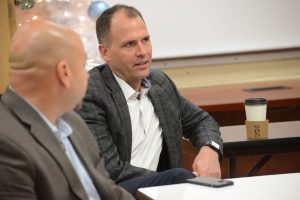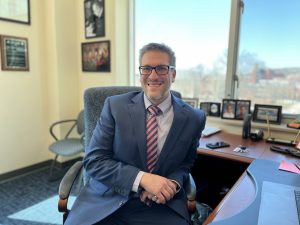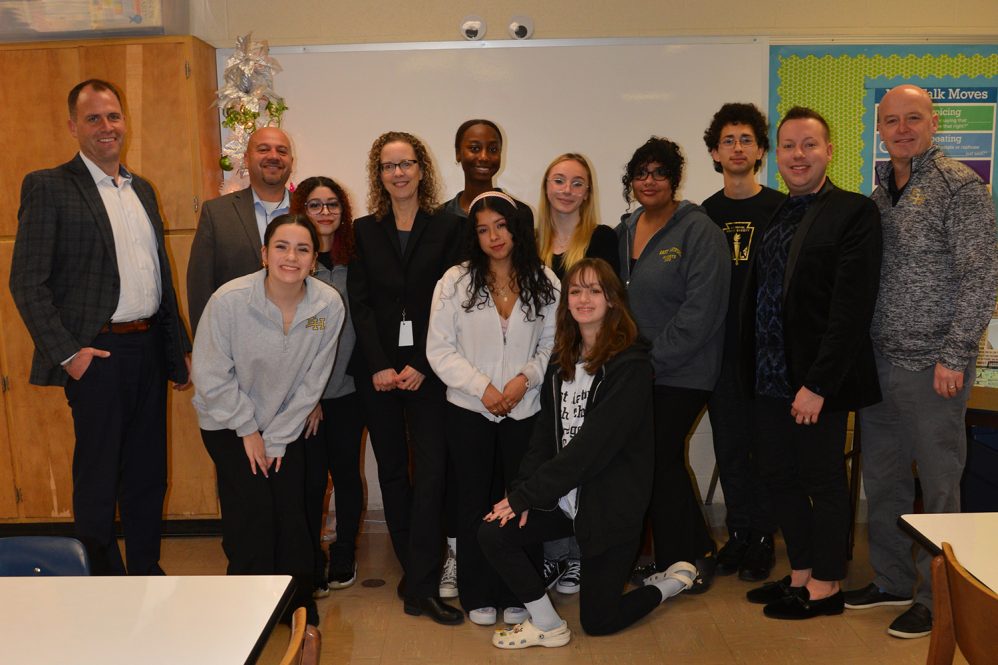When Dean Jason G. Irizarry first stepped into his previous role as the Neag School of Education’s associate dean for academic affairs in 2020, he hosted a conversation about the Neag School providing Early College Experience (ECE) courses in Connecticut high schools. ECE courses allow high school students to earn UConn credits and meet general education requirements by taking college courses while still in high school.
“It was something I felt passionate about and wanted to bring to fruition,” Irizarry says. “So, I pushed us to develop one course in each department to make it a Schoolwide initiative.”
Irizarry was determined to make educational opportunities accessible to more students, particularly first-generation college students like himself.
“Aspiring college students often don’t have the time for career exploration,” he says. “We need to be proactive in nourishing the pool of future educators and ensure our programs stay strong.”
Declining enrollments in educator programs nationwide motivated him to find creative solutions. While the Neag School’s teacher education program remains strong, the overall national trend concerns Irizarry.
“As schools of education decline in enrollment, we want to continue to draw the best and brightest from across the state,” he says. “Our ECE courses aim to provide career exploration opportunities. We offer not just educator preparation courses but also a sport management course, as many young people aren’t aware of the possibilities that sport management offers.”
“Aspiring college students often don’t have the time for career exploration. We need to be proactive in nourishing the pool of future educators and ensure our programs stay strong.” — Dean Jason G. Irizarry
By the start of the 2022-2023 academic year, the Neag School developed four UConn courses dedicated to studying diverse aspects of the education field: EDCI 1100: If You Love It, Teach It; EDLR 1162: Health and Education in Urban Communities; EDLR 2001: Contemporary Issues in Sport; and EPSY 1100: Introduction to Special Education.
EDCI 1100 gives high school students a glimpse into the world of K-12 teaching, learning, and schooling in the U.S. Designed to provide students with an understanding of the historical, philosophical, and social foundations of education, it also encourages them to reimagine the future of the field.
Through the EDLR 1162 course, students explore how poverty, culture, and identity can affect children’s health, nutrition, schooling, and opportunities for success. Class members analyze society’s policies, norms, and beliefs through reading, films, discussions, and service-learning opportunities while considering how these phenomena may perpetuate injustice.
“The service-learning aspect of EDLR 1162 means that, in addition to students learning within their high school classrooms, they also engage in the community, to understand community needs better and to build relationships with others,” says clinical instructor Danielle DeRosa.
DeRosa is also the faculty coordinator for EDLR 2001, a course that delves into sociocultural, economic, political, and other issues specific to the world of sport. Beyond teaching students about sport as a social institution and examining sport’s impact on American culture, the course also covers youth, intercollegiate, professional, and international sports.
According to DeRosa, both EDLR 2001 and EDLR 1162 intend to “engage students in understanding the complexities of society as it relates to justice, education, health, and sport.”
Students specifically interested in special education can obtain an overview of the field in ESPY 1100. The course’s key topics include the various forms of disabilities served in K-12 schools nationwide and the laws supporting students with disabilities and their families.

Building on Existing Partnerships
Irizarry first piloted the ECE courses in five districts where the Neag School already had strong partnerships. One of the pilot schools was East Hartford High School.
“Nate Quesnel, the then-superintendent of East Hartford Public Schools, has always been a visionary partner,” Irizarry says. “We began with schools where we knew we could get traction and figure out the best approach.”
The pilot year in 2021-2022 was a success and the Neag School’s ECE partnerships expanded to additional schools across the state in 2022-2023.
Quesnel ’01 (CLAS), ’02 MA, ’22 Ed.D., who now leads Norwich Free Academy, was very interested in the partnership when he led East Hartford Public Schools.
“Dean Irizarry called me within days of being named dean and said, ‘Hey, we want to deepen our partnership. We have this neat opportunity to expand ECE courses for kids, specifically to the Neag School,’ ” Quesnel says. “The program took off, and it was an easy sell for the teachers at our school. I appreciate Dean Irizarry’s commitment to this. It’s not just talk; it’s a real program that aims to improve minority teacher recruitment and equity.”
The ECE courses at East Hartford High School have expanded since that first year. They currently offer the special education course and plan on adding the two EDLR courses.
“Our goal is to have a robust program, balancing a diverse range of high-level, career-oriented classes alongside our robust Advanced Placement program,” Quesnel said when he worked in East Hartford. “This program exposes our kids to a life beyond our school and community, broadening their perspectives.”
Neag School Connections at UConn’s ECE Program

UConn’s ECE program is the oldest concurrent enrollment program in the country, with roots dating back to 1955, and the largest in the state of Connecticut with over 15,000 students actively enrolled in coursework. Currently led by Neag School alumnus Chris Todd ’16 MA, the ECE program at UConn helped the Neag School develop and launch its four courses.
“The Neag School’s ECE program aims to foster a diverse educator workforce and explore pathways for high school students interested in pursuing a career in education,” Todd says.
After the Neag School’s initial pilot year, this past academic year saw tremendous success for the Neag School’s ECE courses. Approximately 356 students from 21 partner schools were enrolled in the Neag School courses in 2022-2023, an increase from 201 students in five districts the year before. Participation is projected to increase again for the upcoming school year with 39 anticipated course sections across 25 different partner schools.
“The program has the potential to shape these young minds and open their eyes to the world of education as a profession,” Todd says. “Many students discovered a passion for teaching they hadn’t known existed before.”
Todd had firsthand experience with the ECE program, as a former high school teacher and ECE instructor for UConn’s POLS 1602 course. He worked for Windsor Public Schools for almost 15 years and earned his master’s degree in curriculum and instruction from the Neag School while teaching there. After leaving Windsor, he served as the bureau chief for the Connecticut State Department of Education’s (CSDE) Talent Office for nearly four years before joining UConn’s Office of Early College Programs.
“It was clear the ECE program needed to reach out to more schools and districts, ensuring every student had the opportunity to explore the field of education,” he says. “I think the power of the Neag School course offerings through the UConn ECE program is the intentionality of not only providing attractive elective options for high school students to find success and earn credit in a college course, but also create opportunities to celebrate, highlight, and potentially recruit future educators into the profession.”
“Many students don’t see themselves as future educators until someone encourages them to consider a future career,” Todd says.
Providing students the opportunity to demystify postsecondary education and engage in important career exploration around pathways in education has been a central aspect of the Neag School’s efforts to live out its mission and serve students and communities across the state.
“The impact of the Neag School’s ECE initiative will continue to be felt at UConn and across the state for years to come,” Irizarry says.
For more information on the Neag School’s ECE courses, visit ece.uconn.edu/education.



